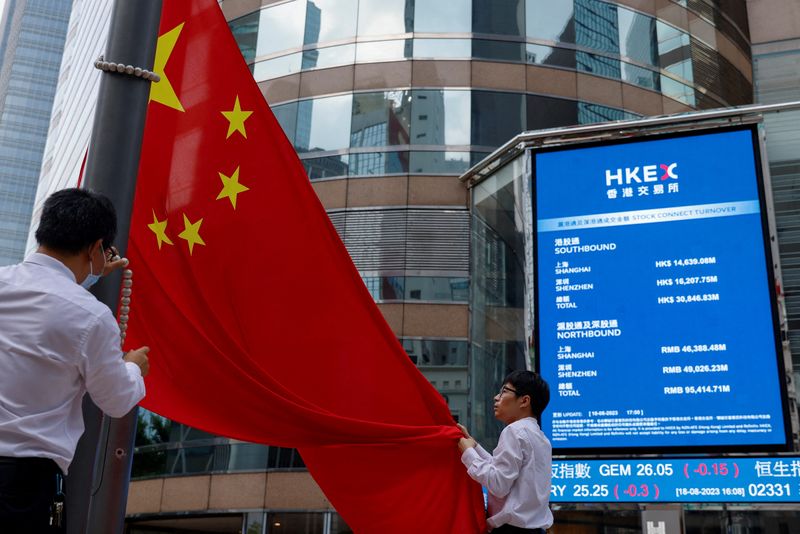By Jamie McGeever
(Reuters) - A look at the day ahead in Asian markets.
The relief rally in Chinese stocks continues as the country prepares for the New Year holiday, but before markets shut down the latest inflation figures on Thursday will show whether the economy is any closer to escaping the clutches of deflation.
Consensus forecasts point to mixed signals - year-on-year consumer price deflation is expected to have intensified in January but month-over-month prices rose at the fastest pace in a year, while annual producer price deflation stayed strong.
China's battle with deflation is symptomatic of the economy's patchy rebound from the pandemic, imploding property sector, high debt and leverage across the economy, and slumping asset markets.
A 6% slump in U.S.-listed shares of China's Alibaba (NYSE:BABA) on Wednesday after the company missed analysts' estimates for third-quarter revenue, could sour sentiment at the market open on Thursday.
If China's inflation figures show price pressures are still skewed to the downside, concern that China might export its deflation to the rest of the world is bound to rise.
That would complicate the job of policymakers at the U.S. Federal Reserve and other central banks, and would muddy the waters for investors. Right now though, the party across large swathes of global stock markets shows no sign of winding down any time soon.
The MSCI world index hit a two-year high on Wednesday and has only fallen twice in the last 15 sessions; the S&P 500 hit a record high and is nudging 5000 points; the MSCI index of developed market stocks also hit a record high.
Although the broad steer from three Fed officials on Wednesday was to lean against the 120 basis points of rate cuts this year priced into rates futures markets, bond yields and the dollar edged lower after a 10-year U.S. bond auction.
The U.S. Treasury sold $42 billion of debt at auction - one of the biggest 10-year sales on record - at a yield below the prevailing level at the time of bidding, and demand was strong.
The Reserve Bank of India, meanwhile, delivers its latest interest rate decision on Thursday. The RBI is expected to hold its repo rate steady at 6.50% - untouched in a year and likely to stay there until the second half of this year.
Money market pricing points to the first and only rate cut this year coming in August or October, making the RBI one of the least dovish of any central bank. This helps explain why the rupee is one of the few currencies to have risen against the U.S. dollar this year, even if it has been less than 0.5%.
But it is coming from a low base, a record low base, after trading as low as 83.50 per dollar late last year.
Here are key developments that could provide more direction to markets on Thursday:
- China consumer, producer price inflation (January)

- India interest rate decision
- Japan trade, current account (December)
(By Jamie McGeever)